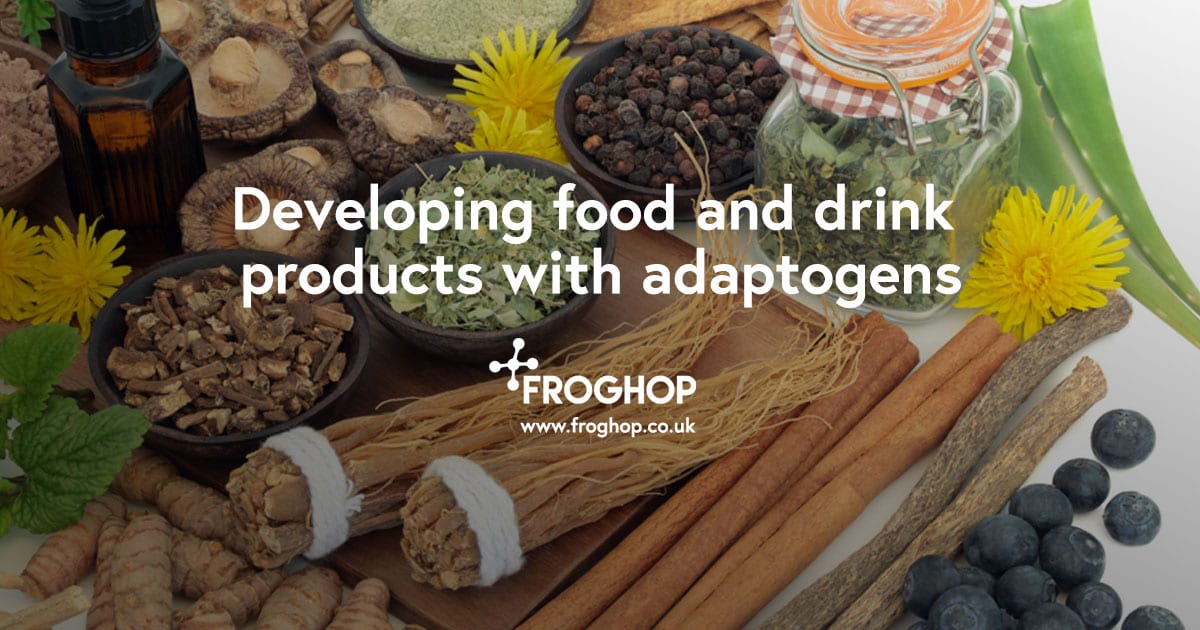If you’re looking for a way to create products that are healthier and help consumers to resist physical, chemical and biological stresses, adaptogens offer a potent solution. But what are they and how should you go about developing food and drink products with adaptogens?
What are adaptogens?
Simply put, adaptogens are potent herbal extracts. While we know they’ve been harnessed in food, medicine and beauty products for centuries, particularly in traditional Ayurvedic and Chinese medicinal practices, the West is now catching on with botanicals trending in the realm of food and beverages.
The term adaptogen was coined by Russian toxicologist Nikolay Lazarev in the 1940s. He stipulated these substances must meet three criteria:
- They must be non-specific and assist the human body in resisting a wide range of adverse conditions, such as physical, chemical or biological stress
- They must maintain homeostasis in humans in that they can offset or resist physical disorders caused by external stress
- They must not harm the normal functions of the human body.
Today, adaptogens are also harnessed to elevate cognitive functions, mood and energy levels. Examples of adaptogens include: mate, maca, guarana, ginseng, mushrooms (like Siberian chaga, Tibetan cordyceps), ashwagandha, turmeric, acerola, moringa, rhodiola, schisandra.
What do they claim?
Energy boosting has long been a property of mate and guarana. Ginseng, rhodiola, schisandra, and cordyceps perform a similar function. Turmeric has long been touted as anti-inflammatory and anti-oxidant.
Bolstering immunity is the claim of the Siberian chaga mushroom (Inonotus obliquus) with its high levels of B-glucan. Dubbed the “mushroom of immortality” and said to protect against premature aging, age-related memory loss and free radical damage.
The Tibetan cordyceps mushroom (Ophiocordyceps sinensis) is said to promote the body’s ability to absorb oxygen, enhancing endurance, stamina and overall strength. The Innova Market report adds “the extract is a bidirectional modulator with both potentiating and suppressive effects on the immune system, meaning that it makes the immune system “smarter and more adaptable” to ongoing threats.”
Wonder plant, ashwagandha (also known as Indian ginseng), contains chemicals that might help calm the brain, reduce inflammation and lower blood pressure – making it ideal as a stress reliever. It has been assigned a host of other benefits such as increasing libido, improving the symptoms of rheumatoid arthritis, reducing cholesterol and blood sugar and more (although further evidence is needed).
Some commentators – including Kartikeya Baldwa, CEO of Ixoreal Biomed – think that Adaptogens have “an exceedingly bright future as study aids, for mental sharpness and for better cognitive function overall.”
Delivery mechanisms
If you’re looking to develop food and drink products with adaptogens, be aware that currently the most popular forms of adaptogen delivery are capsules, tablets and fluid extracts. Some ingredients have been adapted to offer gentler flavours – such as KSM-66, the branded extract of ashwagandha. It is usually bitter but has been adapted so it doesn’t need to be masked. As a result, it has been used in drinks, burgers, confectionary, health bars, soft chews, chewing gum, granola and tea.
Developing food and drink products with adaptogens
The process for developing food products with adaptogens is the same as we recommend for any other with the emphasis on research and iteration.
- Step 1: Research. Establish the requirements of the claims you wish to make. Check out the EFSA guidance on established claims. Ensure any claim made on a food label in the EU is clear and substantiated by scientific evidence.
- Step 2: Develop a recipe. Develop a recipe and agree the core requirements that deliver the specific ingredients and claims.
- Step 3: Prototype. Create a prototype that delivers on taste, sensory, appearance, shelf-life and so on – and test it!

